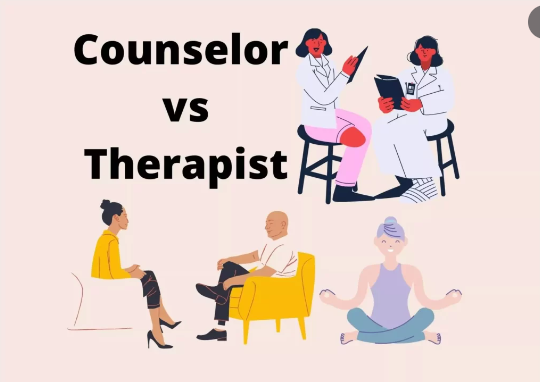Want to know THERAPIST VS COUNSELLOR IN AUSTRALIA 2022-23 ?We all face personal challenges or problems in our lives. We can cope with these situations by talking to friends and family, or by attempting to handle them on our own.
However, there are times when issues are too big for us to handle on our own or cannot be resolved with the help of our friends or family. Seeking assistance and getting help from a professional, such as a counsellor or a therapist, can be beneficial at such times. You must know difference about therapist vs counsellor which you help to whom you need to contact.
WHAT IS A COUNSELLOR?
A counsellor is a highly skilled, objective professional with whom you can develop a healing bond of trust. They are trained to provide various types of assistance, the most common of which is talk-based therapy. The counsellor assists you in addressing your problems in a positive manner by supporting you in clarifying issues, exploring options, developing strategies, and increasing self-awareness. For some persons, simply telling their story to a counsellor and being listened to is beneficial. If you looking for psychotherapists near me . You need to find on Google will show you your nearest place.
A counsellor may occasionally collaborate with a medical doctor or other health professionals to provide integrated and complete care. Counsellors do not give advice to their clients, but instead, help them better understand themselves and find their own ways to handle or resolve problems. Counsellors must ensure that counselling sessions are private. Anyone other than the counsellor should not overhear, record, or observe the sessions. Looking for local psychologist near me ? You need to search on Google you definitely find the your local psychologist
TYPES OF COUNSELLORS:
Counsellors are classified into several categories. This allows people to select a counsellor based on their specific issue.
- Guidance counsellors:
In schools, guidance counsellors serve an important role in assisting students of all ages by navigating a variety of difficulties and situations. A counsellor can help students with their academics, personal problems, and career goals. These counsellors are a valuable resource for both parents and students.
- Marriage and family counsellors:
Marriage and family counsellors help clients resolve conflicts in their relationships. They assist people in sorting through everyday life issues in order to form stronger emotional bonds. Marriage and family counsellors can also help couples before they marry or have children. Attempting to prepare for these life-changing events with the help of a trained professional can result in stronger marriages and relationships.Many people don’t know what is a sex therapist . You must need to know about it
- Mental health counsellors:
Mental health counsellors are highly trained professionals who treat people suffering from mental illnesses. Their clients suffer from mental illnesses such as anxiety, mood disorders, and depression. Many mental health counsellors employ therapeutic practices and activities to assist their clients in navigating challenges and developing healthy routines that can improve their lives.
- Rehabilitation counsellors:
Rehabilitation counsellors assist people who are disabled. Many of their clients suffer from incurable conditions such as autism, multiple sclerosis, arthritis, sickle cell anemia, and dwarfism. They provide life skills instruction to help clients maintain their independence and avoid supported life.
- Substance use counsellors:
Substance use counsellors are also called substance abuse counsellors. They will give advice and assistance to those who are battling drug or alcohol addiction. Additionally, they assist relatives who have been impacted by a loved one’s addiction.
WHAT IS A THERAPIST?
Therapists, also known as psychotherapists, are licensed mental health professionals who specialize in assisting clients in improving their psychological and emotional skills, reducing symptoms of mental illness, and coping with various life challenges.
Therapists are individuals who are skilled and qualified in a variety of psychological techniques. They treat patients with specific types of therapy to assist them in resolving problems in their lives.
TYPES OF THERAPISTS:
There are numerous types of therapists. Some of them are:
- Psychotherapist:
A psychotherapist is the most common type of therapist. A psychotherapist helps patients who suffer from a variety of mental health issues such as stress, sadness, anxiety, and sleeplessness. Talk therapy is one of the methods a psychotherapist uses to treat patients with emotional issues and mental illnesses.
- Behavioral therapists:
Behavioral therapists usually assist patients who are having trouble coping with life because of a mental illness. The therapist teaches techniques that are typically required to help each person gain new skills and talents that will help them be more self-controlled.
- Marriage and family therapist:
Many types of therapy focus on the individual, but a marriage and family therapist, even when treating an individual, focuses on couples and the family unit. These therapists may help couples deal with major life changes such as job loss, relationship issues, or divorce.
- Sex therapist:
A sex therapist is a licensed professional who works with people who are having sexual problems. A sex therapist could be a psychologist, psychiatrist, clinical social worker, family therapist, or a doctor.
DIFFERENCES BETWEEN THERAPIST AND COUNSELLOR:
Counsellor and therapist are frequently used interchangeably because both involve a client meeting with a qualified professional to discuss their issues, problems, and concerns. There are significant differences between a counsellor and a therapist.
Counsellors and therapists are two different types of mental health specialists. Although some of their activities and skills may be similar they have different training techniques and licenses.
Counselors frequently meet for shorter periods of time. You might go to a counsellor if you are having an immediate problem, such as a problem at work, with your kids, or in a close relationship. You could need assistance managing your anger or changing behavior like stopping smoking.
The objective of psychotherapy is to help people better understand their own histories, motivations, and personalities in order to change how they relate to the outside world. Psychotherapists dig “deeper” to study unconscious patterns and the causes of issues.
Counselors may be more future-focused, whereas therapists may be more focused on the past.
SIMILARITIES BETWEEN THERAPIST AND COUNSELLOR:
Counselors and therapists use the same body of knowledge and expertise for diagnosis and treatment. They implement many of the same techniques and treat many of the same conditions, ranging from depression to anxiety to addiction. All of them can provide you with empathy, compassion, and effective solutions to your problems.
They have received training in similar therapy techniques, such as:
- Cognitive-Behavioral Therapy (CBT)
- Dialectical Behavior Therapy (DBT)
- Psychotherapy
- Interpersonal counselling
- Psychodynamic therapy
WHEN YOU SHOULD SEE A COUNSELLOR:
Seeing a counsellor can play a special role in your overall wellness. Counseling is available to everyone who needs it and is having personal difficulties. There are no small or large issues that can’t be helped. The following are common problems for which people seek counsellor:
- Sorrow and loss
- Relationship and communication problems
- Concerns related to the job and career
- Tension, worry, and despair
- Parenting
- Addiction
- Abuse
- Trauma
- Life events such as the birth of a new child, divorce, separation, or death of a loved one
WHEN YOU SHOULD SEE A THERAPIST:
Going to therapy could be helpful if you realize that you constantly struggle with emotional issues that interfere with your daily life. These regular problems might often develop into more difficult problems. These problems include:
- Anxiety disorders
- Stress and being overwhelmed
- Hopelessness
- Illnesses
- Phobias
- Relationship issues
- Mood disorders
- Addictions
- Eating disorders
- Personality disorders
If you are dealing with any of these difficulties, consulting a therapist might be helpful. You can start feeling better by resolving these problems with the help of your psychotherapist.
CONCLUSION:
Remember, no matter what challenges you’re facing, whether you’re experiencing symptoms of a mental health condition or dealing with other issues in your life, you don’t have to struggle alone. A good counsellor or professional therapist can assist you in working through your difficulties in a safe and compassionate environment.
Indulge in Elegance: Melbourne’s Finest Cake Run
January 17, 2024
Leave a reply Cancel reply
-
Your Home Trick or Treat Ready for a Covid-Safe Halloween 2021
October 28, 2021 -
Power Up Your Productivity: Top 10 iPad Accessories for Efficiency
November 27, 2023


